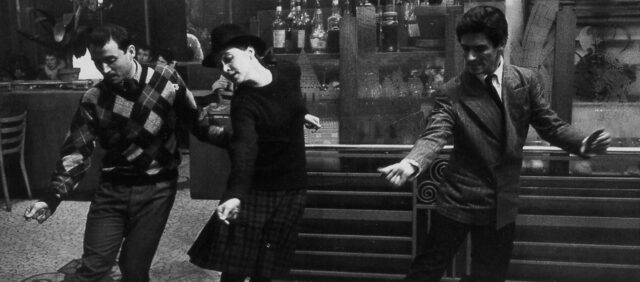Monday Movie: Band of Outsiders, by Scott Nye

Every Monday, we’ll highlight a piece of writing from our vaults. This review of Band of Outsiders originally ran as a home video review.
I feel bad for all those other films that don’t get to be Band of Outsiders.
Now, I suppose that’s a sort of ironic thing to say, given that I prefer dozens, if not hundreds of films more than Jean-Luc Godard’s 1964 classic, and on my list of favorite Godard pictures, it’s certainly not at the top. Which is not to diminish it, not one bit. Band of Outsiders has a spirit to it from which nearly all other films could benefit. It has a melancholy quality somehow enhanced by its flights of fancy for which it’s (justly) better remembered. It can be cruel and bitter, but also unbelievably generous. It can be a gangster film one second, a romance the next, a travelogue after that, a comedy all mixed up in there, and a musical, even apart from its most famous section. Its characters always move in dance, atop wheels or in fights, the way they lean against walls or dodge the man checking identification in front of the schoolhouse. They don’t possess the natural cool that Belmondo and Seaberg had in Breathless, but they’d like to, and in this way, they’re closer to us, and somehow cooler for it.
Godard’s films are full of these contradictions, as characters proclaim their love for one another, only to treat them like shit, or vice-versa. They’re at once incredibly naturalistic (Raoul Coutard shoots Godard’s black-and-white features like documentaries) and almost painfully stylized (Godard’s dialogue is meant to be spoken, but not like we speak). It’s an external expression of internal conflict, the raging desire to be something more than we are, but trapped by our limited capacities. Odile, Franz, and Arthur (Anna Karina, Sami Frey, and Claude Brasseur, respectively) don’t quite to seem to fit in with any crowd, except the one they clumsily create together.
Franz and Arthur are both in love with Odile, naturally (not only because this is that kind of story, but because you can’t help but love Karina), but we almost get the sense that Odile isn’t used to this kind of attention. At the beginning of the film, she carries herself awkwardly, dressed in a very old-fashioned manner and hesitant to speak up. Once she spends a little time with the boys, she’s leading them in a dance, leading them to run through the Louvre, leading them on. Once she spends a little too much time with them, she’s bound and gagged, her stockings serving as masks for her accomplices, who have at least in part used her in order to get at a pile of money in her aunt’s house. Who knows, maybe marriage is in the future? It’s all about contradictions, wild impulses towards unthinkable acts of the Id. The French title is Bande à part; when read in the English language, it’s an even lovelier incongruity.
People say it’s one of Godard’s most accessible films, and I suppose that’s true, as far as it goes. It was the first one I ever saw, and I fell for it instantly. I didn’t understand its many allusions then, and I certainly don’t understand them all now. The more intellectual qualities of Godard’s work is not the cinema to which I respond. It’s in glances, gestures, ways of speaking and posing. The longing, more than anything – to be understood, to be loved, to even be noticed, but unable or unwilling to express oneself totally. Odile, Franz, and Arthur have a raging sea of emotion buried far too deep to tap into. They’re the perfect Godard protagonists, certainly, but they’re also the perfect subject for cinema, the one form in which we can watch somebody closely, endlessly, and come to understand them without ever hearing a word of dialogue. We just have to watch them fidget in a chair, or see how they pass time while waiting for someone to show up.
But to our unending benefit and joy, we get to watch them dance.






























